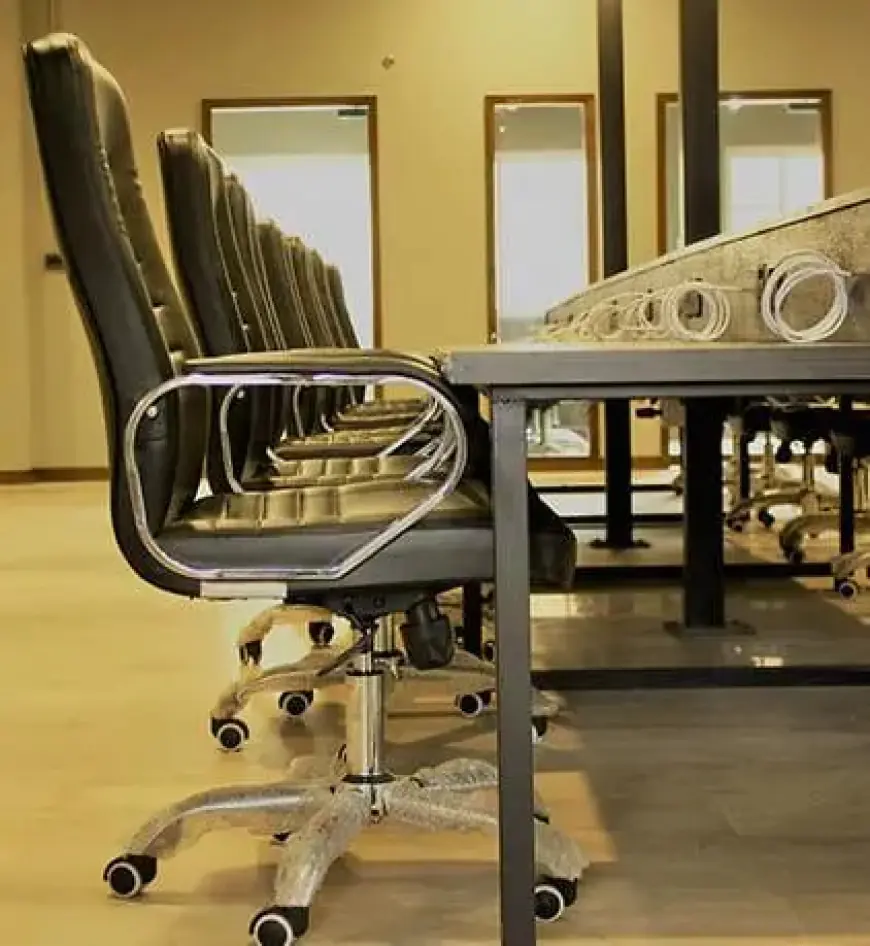Building a Collaborative Culture in Shared Office Desk Environments
Building a collaborative culture in a shared office desk environment requires intentional design, open communication, and a strong sense of community.

Collaboration is the cornerstone of innovation, and shared office desks are designed to foster this synergy. These setups, commonly found in coworking spaces and shared office spaces in Islamabad, offer opportunities for professionals and businesses to connect, exchange ideas, and work together. However, cultivating a truly collaborative culture requires intentional planning, clear communication, and a commitment to inclusivity.
This article explores strategies to promote collaboration in shared office desk environments, ensuring you make the most of your workspace.
1. Recognize the Value of Collaboration
Shared office desks naturally encourage interaction among professionals from diverse industries and backgrounds. Some key advantages include:
- Fresh Perspectives: Collaborating with people from varied fields inspires innovative ideas.
- Networking Opportunities: These spaces allow individuals to build valuable professional connections.
- Enhanced Creativity: Working alongside others often sparks creativity and problem-solving.
- Resource Efficiency: Shared resources reduce operational costs for businesses and individuals.
Understanding these benefits can motivate teams and individuals to embrace a collaborative mindset.
2. Design the Workspace for Engagement
The physical setup of the office plays a critical role in fostering collaboration.
- Open Layouts: Spaces with open seating arrangements promote interaction and teamwork. Avoid overuse of dividers or partitions that create isolated work areas.
- Casual Gathering Areas: Common spaces like lounges or coffee zones provide opportunities for informal conversations and brainstorming.
- Private Zones: Offer coworking private offices or executive office suites for those needing focused, uninterrupted work sessions.
- Flexible Workstations: Configurable desks and seating arrangements accommodate different team sizes and working styles.
When choosing a coworking space in Islamabad, prioritize locations that offer these design elements to support collaboration.
3. Promote Open Communication
Effective communication is essential for fostering collaboration in any environment, especially in shared office setups.
Steps to Encourage Communication:
- Organize Regular Check-Ins: Facilitate team discussions or brainstorming sessions to exchange ideas.
- Use Technology: Employ tools like Slack, Microsoft Teams, or Trello for seamless communication among team members, including those working remotely.
- Encourage Feedback: Foster a culture where everyone feels comfortable sharing suggestions or raising concerns.
In a shared office space in Islamabad, shared bulletin boards or digital group chats can help keep everyone informed and engaged.
4. Create a Strong Sense of Community
Building meaningful relationships is key to developing a collaborative culture in shared office environments.
- Welcome New Members: Make new joiners feel at home by introducing them to the community and sharing workspace guidelines.
- Plan Social Events: Organize activities like team lunches, workshops, or networking events to encourage bonding.
- Celebrate Successes: Acknowledge both individual and team achievements to inspire morale and camaraderie.
In smaller setups like a small coworking space, fostering community connections can have an even greater impact on workplace dynamics.
5. Leverage Technology for Teamwork
Technology plays a vital role in enabling collaboration, especially in shared workspaces.
Recommended Tools:
- Google Workspace: Collaborate on shared documents, spreadsheets, and calendars in real-time.
- Project Management Software: Tools like Asana or Monday.com help teams stay organized and track progress.
- Virtual Collaboration Platforms: Use apps like Miro for brainstorming and visual collaboration.
- Time Management Solutions: Applications like Clockify streamline scheduling and improve productivity.
Ensure the coworking space in Islamabad you select has reliable internet and modern tech infrastructure to support these tools.
6. Encourage Knowledge Sharing
Shared office environments are excellent platforms for exchanging knowledge and expertise.
- Skill Workshops: Host sessions where members can teach or share their expertise with others.
- Shared Resources: Provide access to a library of tools, software, or books relevant to various industries.
- Industry Insights: Create opportunities for professionals from different fields to discuss trends and challenges.
For example, a startup founder in an executive suite might gain valuable design insights from a freelance graphic artist working in the same space.
7. Establish Clear Guidelines
While collaboration is essential, setting ground rules ensures that shared office spaces remain respectful and productive.
- Office Etiquette: Define rules for using shared desks, such as maintaining cleanliness and managing time.
- Noise Management: Encourage quiet zones or the use of headphones for phone calls and meetings.
- Conflict Resolution Policies: Outline steps for addressing and resolving any disputes that may arise.
Selecting a shared office space in Islamabad with established policies can help streamline this process.
8. Empower Leadership and Initiative
Leadership doesn’t always come from the top in collaborative settings. Encourage team members to take ownership of projects and lead discussions.
- Identify Potential Leaders: Spot individuals with natural leadership qualities who can inspire others.
- Promote Decision-Making: Allow individuals to take responsibility for decisions within their areas of expertise.
- Reward Contributions: Recognize team members who actively contribute to creating a collaborative culture.
These practices can be highly effective in executive suites or coworking private offices, where leadership opportunities often lead to professional growth.
9. Adapt to Local and Cultural Dynamics
Understanding and respecting local culture can strengthen collaboration in shared office environments.
- Embrace Diversity: Celebrate cultural differences to foster an inclusive and welcoming atmosphere.
- Align Work Practices: Be mindful of local work schedules and holidays when planning events or meetings.
- Engage with the Community: Partner with local organizations or support community initiatives to build a shared sense of purpose.
For teams working in coworking spaces in Islamabad, these strategies can create a stronger connection with the local ecosystem.
10. Evaluate and Refine Collaboration Efforts
Regularly assessing the success of your collaboration strategies ensures continuous improvement.
Key Metrics:
- Engagement Levels: Are team members actively participating in discussions and activities?
- Productivity Metrics: Has teamwork improved output and efficiency?
- Feedback Analysis: Collect feedback from coworkers to identify areas for improvement.
By tracking these metrics, you can refine strategies and adapt to the evolving needs of the workspace.
Conclusion
Building a collaborative culture in a shared office desk environment requires intentional design, open communication, and a strong sense of community. By embracing these practices, businesses and professionals can thrive in coworking spaces, whether in shared office spaces in Islamabad, small coworking spaces, or executive suites.
Choose a flexible workspace that supports collaboration, invest in the right tools, and nurture relationships to unlock the full potential of shared office environments. Collaboration isn’t just a benefit—it’s a necessity for success.
What's Your Reaction?
 Like
0
Like
0
 Dislike
0
Dislike
0
 Love
0
Love
0
 Funny
0
Funny
0
 Angry
0
Angry
0
 Sad
0
Sad
0
 Wow
0
Wow
0















































